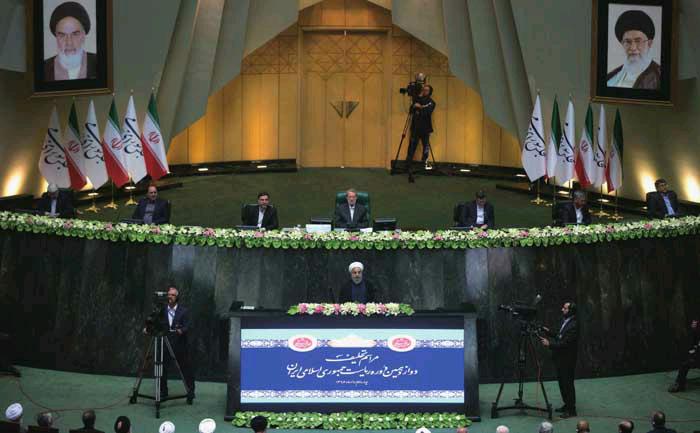More Tests Ahead
By+Ma+Xiaolin
Hassan Rouhani was sworn in as Iranian president for his second four-year term in Tehran on August 5.
Rouhani won reelection in May by a wide margin, taking 57 percent of the vote. However, Iran now faces hard challenges and potent threats. He must lead the country to break through the current outside encirclement that is being built by the United States and its Gulf allies, as well as achieve progress in domestic affairs.
Irans supreme leader, Ayatollah Ali Khamenei, gave his official seal of approval to Rouhani at a formal endorsement ceremony in Tehran on August 3. In his speech, Khamenei also expressed his expectations for Rouhani to maintain fairness and justice in governance, safeguard the interests of underprivileged groups, strengthen national unity, and protect national dignity and sovereignty. Khameneis remarks could be regarded as general instructions for Rouhanis policymaking during his second presidential term.
At the endorsement ceremony, Rouhani pledged to continue constructive interactions with the international community and safeguard Islamic democracy and the peoples right to vote. His agenda also includes reducing poverty, strengthening social welfare, raising productivity and promoting employment.
External pressure
It is a heavy task for Rouhanis government to realize economic growth and improvement of peoples livelihoods in the next four years. Especially, to revitalize its domestic economy, Iran needs a sound and stable external environment as a prerequisite.
Iran is always a critical geopolitical player in the Middle East, the worlds most complicated region. The longstanding tension between Iran, where Shiite Muslims are the majority, and Sunni-dominated Gulf states, the hostility between Iran and Israel, and the U.S. sanctions on Iran all have become burdens on Irans domestic development. Therefore, Rouhani concentrated on improving diplomacy and security in his fi rst presidential term.
Rouhani seized the opportunity when the Middle East was in chaos after the “Arab Spring”movement of 2011 and then President Barack Obama made adjustments to U.S. Middle East policy. The Obama administration and the Rouhani administration together with other world powers reached a nuclear deal in 2015, which has been regarded as a diplomatic victory for Rouhani that breaks the Western blockade. In the deal, Tehran finally made concessions, abandoning its nuclear weapon program. In return, Washington and the international community recognized Irans right to make use of nuclear energy peacefully. Furthermore, the United States and the West agreed to partially lift the sanctions on Iran, making it possible to improve U.S.-Iran bilateral relations. Meanwhile, through strategic cooperation with Russia in addressing the Syrian crisis, Iran has expanded its infl uence on other Shiite-led countries including Syria and Iraq, and gained a louder voice in regional affairs.

